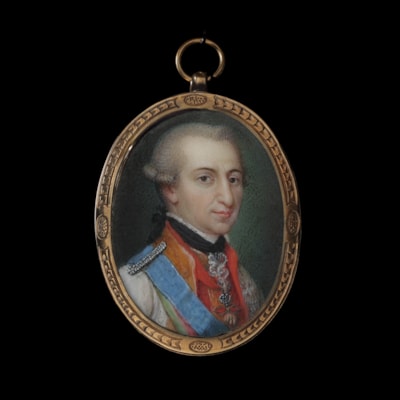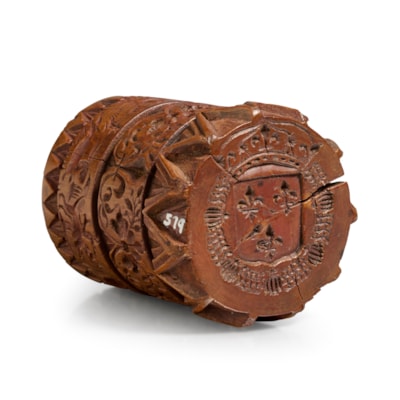SAMUEL SHELLEY
(1750/56-1808)Portrait miniature of a Gentleman, wearing blue coat with black collar and pale lemon-coloured waistcoat, frilled shirt and powdered hair worn en queue
Watercolour on ivory
Ivory registration number: 8MF5A1T8
Gold frame, the reverse with panel glazed to reveal plaited hair
Oval, 2 ¾ inches (70mm) high
£2,000
Whilst Shelley had followed a conventional route into his chosen career, he later diversified from the traditional portrait miniature. After studying at the R.A. schools from 1774 (and exhibiting 1774-1804), he became an important voice in the history of watercolour painting in the eighteenth century. A founder member of the first watercolour society in 1805, he believed that watercolours should be given their own forum and exhibition in a separate space, in order to be properly appreciated. Before the formation of such a society, watercolours could only be shown next to oils at the conventional exhibition spaces of the Society of Artists or Royal Academy. This new separation from brightly coloured, large oil paintings allowed watercolours to be viewed among paintings in the same media and heralded a new admiration of such work. Shelley's desire to compete with oil paintings also led him to produce small watercolour subject pictures to exhibit alongside the portrait miniatures he painted all his life.
Shelley’s work was much admired in its day and compared to the great names of the period, as evidenced in a letter to his brother from the young miniaturist Andrew Robertson in 1802. He said that the portrait painter Martin Archer Shee had that if he (Robertson) pursued his ambition he would exceed Cosway and Shelley as an artist. Although Shelley also worked at court, although he never attained an official position with the royal family. He was most financially successful with his portrait miniatures and sold far fewer of his small subject pictures. He lived in London all his life, dying at his home in Hanover Square in 1808.

shipping notice
Worldwide shipping is included in all prices.
The Limner Company does not accept any responsibility for import duty, this is to be paid by the buyer.
Some stock items contain materials from endangered species which are governed by CITES regulations and will require a permit to export outside of Great Britain. If a certificate of export is required then this will be the responsibility of and paid for by the buyer .
you may also like



 +44(0)7983510056
+44(0)7983510056











